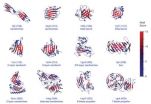(Press-News.org) The studies, published in the acclaimed Scandinavian Journal of Medicine & Science in Sports, show that 24 weeks of twice-weekly recreational football training sessions lower blood pressure and improves heart function in men with high blood pressure and men with type 2 diabetes. Furthermore, men with type 2 diabetes lost 12 % of their abdominal fat and reduced their blood sugar 20% more than inactive control subjects.
These effects are likely to reduce the risk of developing heart diseases including heart failure and myocardial infarction, and the participants had a reduced need for antidiabetic and antihypertensive medication on completion of the studies. The projects investigated the effects of football training in 21 men with type 2 diabetes and 32 men with high blood pressure aged 30‒60 years with focus on metabolic and cardiovascular changes.
Football training increases heart rate and improves general health
"I feel I have more energy in my day-to-day life, and it's definitely connected with being fitter," says Søren Sonberg with type 2 diabetes, who participated in one of the projects.
Professor Jens Bangsbo, leader of the projects, explains: "The average heart rate during training was higher than 80% of maximum heart rate, and for significant periods it was higher than 90%. This type of training is very effective, and after 24 weeks of training physical fitness, measured as maximal oxygen uptake, was 10% higher for the participants with high blood pressure and 12% higher for those with diabetes. At the same time, the diabetes patients lost almost 2 kg of fat. A better fitness combined with a lower body fat percentage makes it easier to carry out daily activities."
Bangsbo continues: "We found that football training in men with type 2 diabetes significantly reduced abdominal fat and improved glycaemic control, which is essential for managing diabetes and preventing diabetic complications."
In both project groups, the heart's contraction phase became significantly more effective, and blood pressure fell by 8-10 mmHg. Peter Riis Hansen, senior cardiologist from Gentofte University Hospital, Denmark, who participated in the studies, comments: "Such changes are remarkable and may reduce the risk of future cardiovascular disease and death". He further notes that: "The results suggest that recreational football training may be a very efficient tool in the treatment of hypertension and type 2 diabetes."
Football training provides social cohesion and the desire for more training
After completion of the projects, the participants continued their training themselves. The reasons are clear, as Sonberg explains: "I feel I have a better quality of life with the football training. I wouldn't ever dream of stopping training now. The social interactions with the others are fantastic, and our football team is currently planning a training camp abroad. The training has given us the desire for much more."
INFORMATION:
Contact
Jens Bangsbo, Professor, Director of the Copenhagen Centre for Team Sport and Health, University of Copenhagen.
E-mail: jbangsbo@nexs.ku.dk – tel.: +45 35 32 16 23
Peter Riis Hansen, senior cardiologist, Department of Cardiology, Gentofte University Hospital.
E-mail: peter.riis.hansen@regionh.dk – tel.: +45 31 31 18 31
Bo Kousgaard, Head of Communication, Copenhagen Centre for Team Sport and Health, University of Copenhagen.
E-mail: bok@science.ku.dk – tel.: +45 23 23 86 24
Recreational football can treat hypertensive and type 2 diabetes patients
2014-06-12
ELSE PRESS RELEASES FROM THIS DATE:
Does food addiction exist?
2014-06-12
Women with weight problems were more impulsive than average in a food-related psychology test, a new research paper has shown. This suggested that they are more instinctively stimulated by images of food as well as lacking contemplative will power. Further, some women reported food craving even if they had eaten recently, a symptom of possible food addiction.
"All addictions are similar in that the sufferer craves to excess the feel-good buzz they receive from chemical neurotransmitters produced when they eat, gamble, smoke, have sex or take drugs," commented Claus Voegele, ...
Blood product sterilization taken too far?
2014-06-12
Certain processes used to sterilize blood products could potentially cause serious health issues in transfusion recipients, according to an international study published in the journal Platelets and led by Dr. Patrick Provost of Université Laval's Faculty of Medicine and the CHU de Québec Research Center. These processes purportedly alter the blood platelets to the extent of preventing them from carrying out their functions correctly and may be the cause of hemorrhages observed in patients having received treated blood.
The function of platelets goes far beyond their ...
When good people do bad things
2014-06-12
CAMBRIDGE, MA -- When people get together in groups, unusual things can happen — both good and bad. Groups create important social institutions that an individual could not achieve alone, but there can be a darker side to such alliances: Belonging to a group makes people more likely to harm others outside the group.
"Although humans exhibit strong preferences for equity and moral prohibitions against harm in many contexts, people's priorities change when there is an 'us' and a 'them,'" says Rebecca Saxe, an associate professor of cognitive neuroscience at MIT. "A group ...
Study of white sharks in the northwest Atlantic offers optimistic outlook for recovery
2014-06-12
White sharks are among the largest, most widespread apex predators in the ocean, but are also among the most vulnerable. A new study, the most comprehensive ever on seasonal distribution patterns and historic trends in abundance of white sharks (Carcharodon carcharias) in the western North Atlantic Ocean, used records compiled over more than 200 years to update knowledge and fill in gaps in information about this species.
Scientists from NOAA Fisheries and colleagues added recent unpublished records to previously published data to present a broad picture of 649 confirmed ...
Antibodies from the desert as guides to diseased cells
2014-06-12
The use of nanoparticles in cancer research is considered as a promising approach in detecting and fighting tumour cells. The method has, however, often failed because the human immune system recognizes the particles as foreign objects and rejects them before they can fulfil their function. Researchers at the Helmholtz-Zentrum Dresden-Rossendorf (HZDR) and at University College Dublin in Ireland have, along with other partners, developed nanoparticles that not only bypass the body's defence system, but also find their way to the diseased cells. This procedure uses fragments ...
Proliferation cues 'natural killer' cells for job change
2014-06-12
PROVIDENCE, R.I. [Brown University] —The immune system maintains a rich abundance of "natural killer" cells to confront microbial invaders, but as the body gains the upper hand in various infections it sometimes starts to produce even more of the cells. For three decades, scientists haven't understood what purpose that serves. In a new paper, Brown University researchers show one: proliferation helps change the NK cells' function from stimulating the immune response to calming it down, lest it get out of hand.
In a series of experiments now published online in the Journal ...
The transmission of information via proteins could revolutionize drug discovery
2014-06-12
Proteins are chains of amino acids that, when folded into certain structural patterns and also when unfolded, exert functions within cells. Proteins receive signals that are transmitted from one to the next and that are essential for life. However, within a given protein, are there "highways" along which the signals travel, like a in a relay event? That is to say, how is the information transmitted in a given protein? "This is one of the key questions in biophysics," says Xavier Salvatella, ICREA Professor at the Institute for Research in Biomedicine (IRB Barcelona) and ...
Tiny plants ride on the coattails of migratory birds
2014-06-12
Since the days of Darwin, biologists have questioned why certain plants occur in widely separated places, the farthest reaches of North American and the Southern tip of South America but nowhere in between. How did they get there? An international team of researchers have now found an important piece of the puzzle: migratory birds about to fly to South America from the Arctic harbor small plant parts in their feathers.
In the past several decades, scientists have discovered that the North – South distributions of certain plants often result from a single jump across the ...
Chimpanzees spontaneously initiate and maintain cooperative behavior
2014-06-12
VIDEO:
Chimpanzees spontaneously cooperate with multiple partners of their choosing to remove a barrier and pull in a tray baited with food.
Click here for more information.
Without any pre-training or restrictions in partner choice among chimpanzees, researchers at the Yerkes National Primate Research Center, Emory University, found for the first time that chimpanzees housed in a socially complex, contained setting spontaneously cooperate with multiple partners of their choosing. ...
All men with gout should be routinely screened for erectile dysfunction
2014-06-12
A new study presented today at the European League Against Rheumatism Annual Congress (EULAR 2014) showed that erectile dysfunction (ED) is present in most men with gout and is frequently severe.1
In a survey of 201 men, 83 had gout, of whom a significantly greater proportion had ED (76%) compared with those patients without gout (52%) (p= 0.0007). Also, a significantly greater proportion of gout patients (43%) had severe ED compared with patients without gout (30%) (p=0.007).1
According to lead author Dr. Naomi Schlesinger, Chief, Division of Rheumatology and Professor ...



